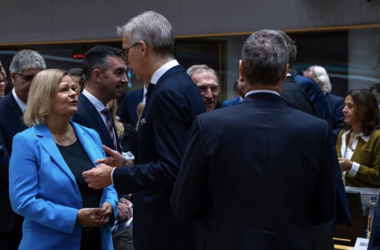A sharp rise in energy prices has strained relations between Sweden and Germany, with Swedish Deputy Prime Minister and Energy Minister Ebba Busch blaming Germany’s heavy reliance on renewable energy.
The December 12 price surge occurred during a “Dunkelflaute” – a period of minimal wind and sunlight – which left renewable energy sources struggling to meet demand.
Germany’s decision to shut down its last nuclear power plants in April 2023 has exacerbated the problem. With renewable energy unable to keep up, Germany imported significant electricity from Sweden, driving up prices in southern Sweden. Busch criticized this dependency on weather-dependent energy, calling it “a challenge, as last week showed.” She remarked, “No political will is strong enough to override the laws of physics – not even that of [German climate minister Robert] Habeck.”
Busch also expressed frustration over Germany’s decision to phase out nuclear energy prematurely, saying it impacted energy prices across Northern Europe.
Germany’s climate ministry countered Busch’s criticism, arguing that Sweden also benefits from Germany’s wind power during peak times. “At times of little wind, we import electricity from Sweden… This is how electricity trading works,” the ministry stated.
However, data reported by Bild painted a different picture, showing that Germany imported significantly more energy from Sweden in 2024 than it exported.
The high prices also drew backlash within Germany. Dirk Howe, managing director of Siempelkamp, a Krefeld foundry, criticized the energy system, calling it “pure madness.” He revealed his company had to cut production by 30%, reduce shifts, and send workers home due to soaring costs.
As energy prices remain volatile, the situation has reignited debates over the viability of Germany’s renewable energy policies and their ripple effects across Europe.




